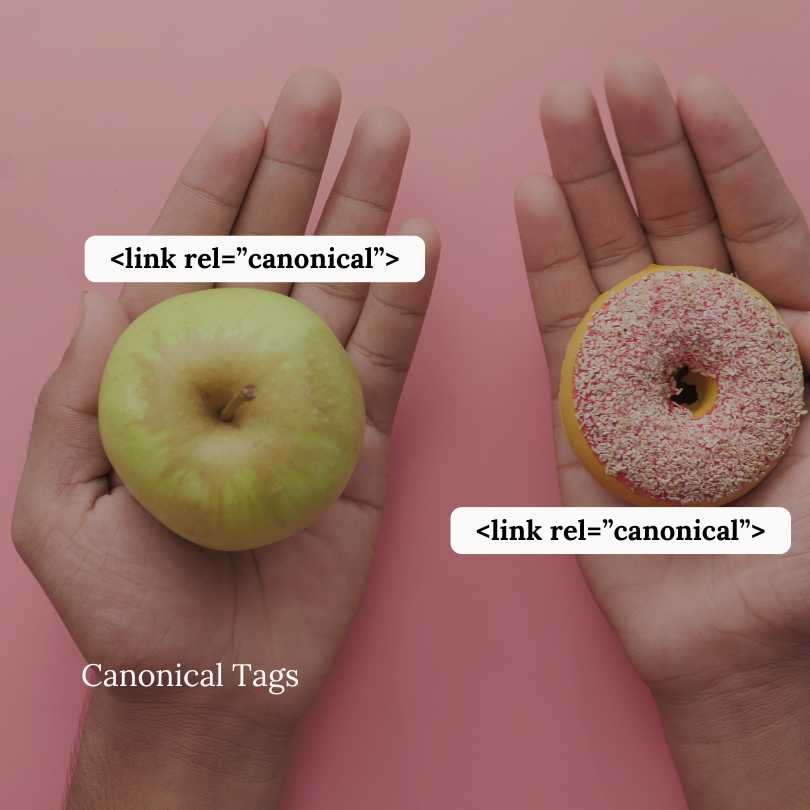
What Is a Canonical Tag and Why Does My Website Need Them? More SEO Talk.
If you’ve ever tried to handle SEO for your own website, you already know: it’s a journey.
And for most business owners, it goes something like this. You dive in with good intentions — watching tutorials, installing plugins, researching keywords.
Then reality hits. It’s time-consuming, confusing, and it doesn’t deliver overnight wins. At some point, you probably thought “This is why people hire an SEO or website manager.” Because trying to figure it all out while also running a business? It’s overwhelming.
- Maybe you gave up.
- Maybe you did everything you could and left it as-is.
- Or maybe you convinced yourself SEO isn’t that important.
But here’s the truth — SEO still matters. And when done right, it can be one of the most valuable assets your business has.
What is a Canonical Tag?
A canonical tag is an HTML element that tells search engines which version of a webpage should be treated as the primary (or “canonical”) version — especially when multiple URLs contain similar or duplicate content. Setting the correct canonical URL for each page helps search engines understand which version to index and rank, preventing duplicate content issues and consolidating value.
Yes, canonical tags can harm your websites SEO.
When your website has dedicated pages for specific services or products, setting a proper canonical tag on each page is crucial. Whether you’re using a plugin or coding it manually, the goal is the same: tell search engines which version of the page should be indexed to avoid confusion and duplicate content penalties.
If you’re managing your site manually, you can add the canonical tag in the <head> section of your header.php file using the html below

This ensures each page points to itself as the preferred version.
For WordPress users, SEO plugins (like All in One SEO or Yoast) often provide an easier way to set canonical URLs per page. However, relying on a plugin without properly configuring it can cause issues. For example, if the canonical tag isn’t explicitly set for each page, the plugin might default to using your homepage URL as the canonical tag across the entire site.
This mistake creates duplicate content signals, wastes your crawl budget, and can hurt your visibility — especially for deeper or service-specific pages.
Do Canonical Tags Matter on No-Index Pages?
The short answer is YES, but ultimately the answer depends on the intent of the page and how search engines treat it.
A no-index tag tells search engines not to index a page in search results. A canonical tag, on the other hand, tells search engines which version of similar or duplicate content to prioritize.
So what happens when both appear together?
- If a page is marked as no-index, Google may ignore its canonical tag entirely.
- Google typically does not pass link equity (ranking signals) from a no-indexed page, even if it has a canonical pointing elsewhere.
- This means: Using canonical tags on no-index pages won’t help consolidate SEO value.
When would you use them together?
You might still add a canonical to a no-index page for consistency or future-proofing, but don’t rely on it to boost another page’s SEO. If the page truly shouldn’t be indexed, focus on that — and don’t expect it to pass SEO signals.
5 Common Canonical Tag Mistakes That Hurt SEO
Implementing canonical tags correctly is essential for preventing duplicate content and improving your site’s visibility in search engines. Here are five common mistakes — and what they really mean for your rankings
-
Pointing to the Wrong URL
If a canonical tag on a detailed page (e.g., /services/ground-freight) points to a broader or unrelated page (like /services), you’re telling Google to ignore the more specific, optimized page
Result: Your detailed content gets de-indexed in favor of a less relevant page — and you lose out on targeted traffic.
-
Missing Self-Referencing Canonical Tag
Every page should have a self-referencing canonical tag, for example:
<link rel=”canonical” href=”https://example.com/page” />
Without it, search engines might get confused, especially when:
URLs vary slightly (with/without www, trailing slashes, etc.)
Tracking parameters (like ?ref=google) are added
Result: Google may treat the same page as multiple duplicates, leading to diluted rankings or penalties.
-
All Pages Canonical to One URL
Imagine these three unique pages:
-
- /houston-product 1
- /houston-service 1
- /houston-service 2
If all three use a canonical tag pointing to /houston-product 1, Google will only index that one — and ignore the others.
Result: Valuable content is suppressed, even if each page offers content for something different.
- Incorrect Canonical Tags on Paginated Pages
For paginated content (like /blog/page/2), some mistakenly set all canonicals to /blog.
Result: Deeper content pages are devalued or ignored, wasting crawl budget and reducing visibility for long-form or archived content.
-
Canonical Tags Pointing to the Homepage
This is one of the most damaging mistakes: setting the homepage as the canonical URL on every page.
Result: Google sees all your content as duplicates of the homepage, causing major drops in traffic and lost rankings across your site.
Final Thoughts: Don’t Overlook the Details
SEO matters — not just for traffic, but for the long-term visibility and growth of your business online. But here’s the truth: SEO is not an overnight fix. It’s a strategic, ongoing process that requires attention to detail — and canonical tags are one of those details that can quietly make or break your site’s performance.
Setting up canonical tags correctly ensures search engines understand your content structure, avoid indexing duplicates, and focus their attention on your most valuable pages.
If you’re feeling overwhelmed or unsure if your site is properly optimized, don’t leave it to chance.
Hire a professional. At HTX Website Designs LLC, we specialize in Local SEO-friendly website development and WordPress optimization — so you can focus on running your business while we make sure your site gets seen.

Sign Up To Our
Newsletter
Be the first to learn about new blog post & special offers.

